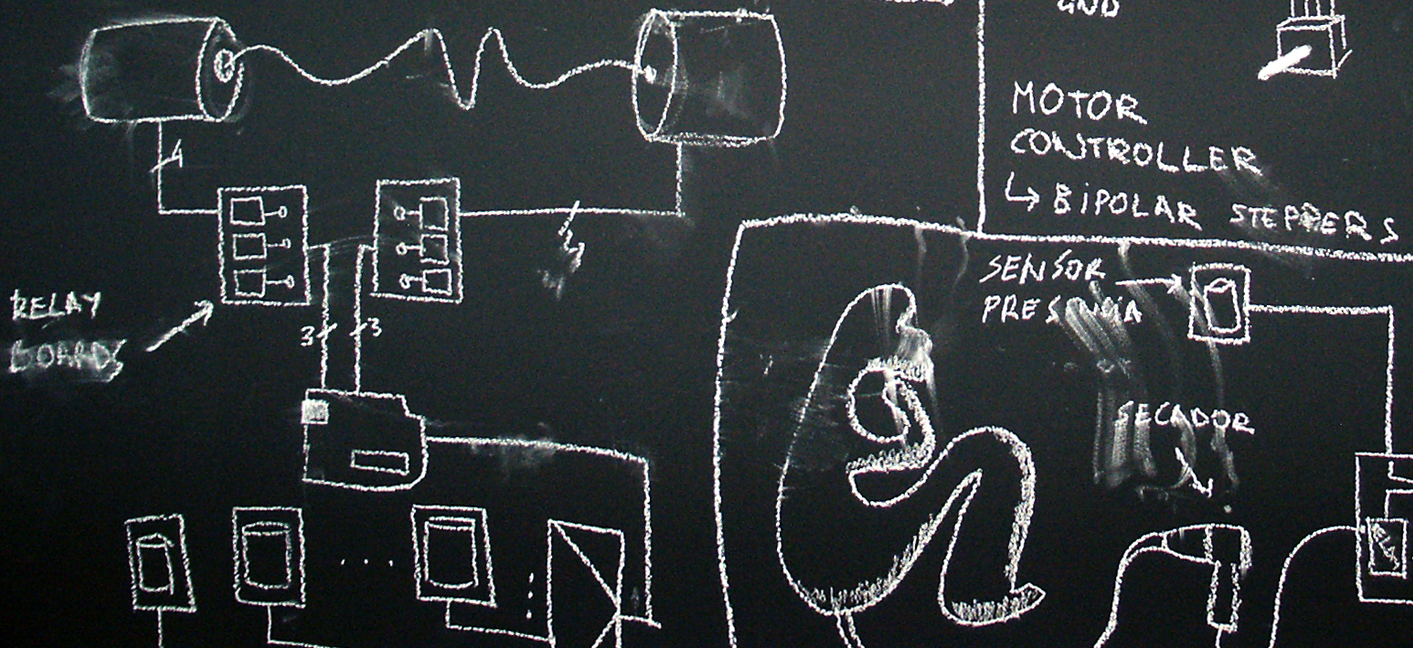INTERACTIVOS?09: Garage Science Workshop-Seminar

Interactivos?'09: Garage Science takes place from January 28 through February 14, 2009
With the participation of Critical Art Ensemble (see statement below) and Julian Bleecker
and with the advice of Antonio Lafuente
An International Workshop-Seminar that includes an intensive project development workshop (January 28 through February 14, 2009) and a seminar with lectures and public theoretical works presentations (January 28 and 29, 2009). Both projects and papers have been selected through international open call.
If you wish to see what is happening, or join any of the work groups a s a collaborator, just come round Medialab-Prado.
> go to the workshop WIKI
> go to the workshop FORUM
> Abstract of selected projects
> INTERACTIVOS?09: Garage Science - Project Showcase (through March 22, 2009)
> Documentation (lecture videos and papers)
> Interactivos?'09: Garage Science Video documentary
Garage Science
The socialization of technology and the accessibility of information available on the Web make it increasingly easy for anyone to have the possibility of building a home laboratory. Garage science is nothing new but home laboratories are connected now more than ever before. There are home laboratories of all kinds: technology factories, chemistry or biology labs, artists' studios, places to rehearse, etc.
These home laboratories have a worldwide scope via the Web, which serves as a space for the dissemination of projects and the exchange of knowledge and techniques. These online communities are accompanied by a proliferation of onsite events, such as dorkbots, barcamps and hackmeetings, where people who only knew each other via the Web can meet face to face and share their achievements and experiences.
The communities formed this way provide citizens with the capacity to develop scientific-technical knowledge comparable to what is produced in the major laboratories. “Citizen science” can serve to explore questions such as: How are the foods we eat made? What possibilities exist in biogenetic research? What is the code that makes the machines we use work? How are those machines manufactured? Based on this knowledge, experimental and critical formulations and objects can be produced proposing new paths and goals in these fields.
Interactivos?'09 aims to explore these practices, where art, science and technology meet. We invite the participants to turn medialab into a garage laboratory where low-cost, accessible materials are used to develop objects and installations that combine software, hardware and biology. There's license to fail!
Garage Science, by Critical Art Ensemble
Garage science is a term filled to the brim with utopian possibilities; however, unlike similar utopian rhetorical flourishes the form of production it describes can actually have a revolutionary impact on the material landscape of everyday life. At it’s most grandiose, garage science is associated with visionary eccentrics and next-level hackers that have changed the world. The light bulb, radioactivity, antibiotics, the synthesizer, the personal computer, etc. all began to some degree as home projects. Such revolutionary outcomes may not be probable, but they certainly are possible.
But even from a more quotidian perspective, there is every reason to pursue garage science. Before the Reagan Revolution began undermining it, public science was actually encouraged in the US—even by the government (although sometimes for cynical reasons). Numerous journals, magazines, and science supply houses catered to the sizable amateur public anxious to engage new scientific knowledge systems, materials, and processes. The effect was the creation of a citizenry knowledgeable enough about scientific developments—and more importantly, their application in the public sphere—that they were quite capable of intelligently participating in the politics of science.
Needless to say, when the neoliberals took power, they quickly realized this democratic form of politics had to be stopped, and the easiest way to kill it was to halt all forms of amateur science. They believed that knowledge development and management should be handled by small groups of “experts” who shared the ideological values of neoliberalism so that knowledge and its application could be controlled solely from the top down. After thirty years, neoliberal dismantling of the public education system and elimination of amateur science has reached such a point that the public now finds itself dependent on the ‘experts.’ Moreover, it finds plausible the idea that anyone doing science outside the institutions of the experts must be doing it for some nefarious reason.
For Critical Art Ensemble, part of our struggle has been to establish science as a popular site for cultural intervention, and to thereby contribute to a pedagogy that empowers people to challenge the experts, to become active participants in the politics of knowledge of the scientific and techno-spheres, and to expand the possibilities for cultural production into scientific disciplines.



 Medialab-Matadero Madrid
Medialab-Matadero Madrid
